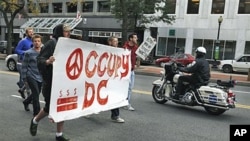A new pledge by President Barack Obama to withdraw nearly all troops from Iraq by the end of the year has received mixed reactions from U.S. war veterans and peace activists. They say they will believe there is a pullout when it actually happens.
At the Freedom Plaza in Washington, one of the sites of the ongoing progressive Occupy movement in the United States, 68-year-old Don Anderson rolls around in a wheelchair.
He was wounded during fighting in the Vietnam War in the 1960s.
Anderson, who came from the northwestern state of Oregon to take part in the protest, said it is not only from Iraq that the president should be pulling U.S. troops out.
“I am very jaded toward our foreign policy and our military policy throughout the globe. We still have 30,000 plus of our military stationed in South Korea. For what? We have got thousands in Germany. For what?” asked Anderson.
Focus on U.S. issues
Protesters here also want to see an end to the conflict in Afghanistan, and elsewhere where U.S. troops are deployed, and more government focus on helping with economic and social problems in the United States.
21-year-old Kyle Szlosek, from the northeastern state of Maine, feels sorry for all the U.S. soldiers still risking their lives in the aftermath of the terrorist attacks against the United States in 2001.
“They do not even know why they are fighting anymore. And none of us really know what the fight is about. We just continue this heinous war thinking that it will make the world a better place. We continue this machine of death and expect to find peace, and it is not going to work,” said Szlosek.
Earlier, from the White House briefing room nearby, President Obama said he was bringing the Iraq war to an end. The United States has already withdrawn nearly 100,000 troops from Iraq as part of the current draw-down with nearly 40,000 troops remaining, in a non-combat capacity.
“The rest of our troops in Iraq will come home by the end of the year. After nearly nine years, America’s war in Iraq will be over,” said Obama.
Deadly, costly war
Prior to the start of the war in 2003, the U.S. and British governments said the possibility of Iraq’s government employing weapons of mass destruction threatened their security and the stability of the Middle East.
The invasion led to the eventual capture of long-time President Saddam Hussein, who was later tried and executed by the new Iraqi government.
Following the invasion, a U.S. fact-finding mission concluded Iraq had ended its nuclear, chemical and biological programs in the early 1990s.
The cost of the war to the U.S. government has been evaluated at more than $700 billion.
The U.S. action also led to an anti U.S-insurgency as well as deadly sectarian violence.
A website called Iraq Body Count says more than 100,000 Iraqi civilians were killed during the conflict. At least 10,000 Iraqi soldiers were also killed in the war.
Honoring troops
According to U.S. government statistics more than 4,400 U.S. troops have been killed.
For those returning alive, Obama promised a hero’s welcome.
“The last American soldiers will cross the border out of Iraq with their heads held high, proud of their success and knowing that the American people stand united in our support for our troops,” said Obama.
Anderson, the Vietnam War veteran, said he hopes that will happen as well, but he doubts there will be sufficient support to deal with all the post-war stress with which the soldiers are dealing.
Despite New Pullout Pledge, US War Vets, Activists Vent




